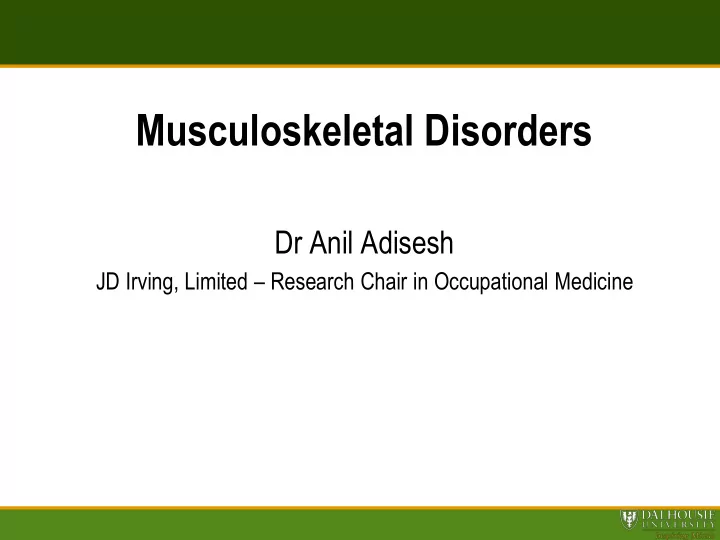

www.dal.ca Musculoskeletal Disorders Dr Anil Adisesh JD Irving, Limited – Research Chair in Occupational Medicine
What is a musculoskeletal disorder? • Musculoskeletal system – two components the muscular system and the skeletal system.
What is a musculoskeletal disorder? • Acute • Chronic • Conditions that involve the nerves, tendons, muscles, and supporting structures of the body and compromise their function.
What is a work-related musculoskeletal disorder? • Work is the only identifiable cause • Work contributes significantly as one of several causative factors
Which parts of the body are affected? Shoulder tendinitis Cervical spondylosis Rotator cuff tendinitis Thoracic Outlet Syndrome Biceps tendinitis Tension Neck Shoulder capsulitis Medial epicondylitis Lateral epicondylitis Forearm pain Carpal Tunnel Syndrome Back pain Wrist Tenosynovitis Hand Arm Vibration De Quervain’s disease Syndrome Knee osteoarthritis Hip osteoarthritis Knee meniscus injury Bursitis
ILO Listed Musculoskeletal disorders • 2.3.1. Radial styloid tenosynovitis • 2.3.2. Chronic tenosynovitis of hand and wrist • 2.3.3. Olecranon bursitis of the elbow region • 2.3.4. Prepatellar bursitis (knee) • 2.3.5. Epicondylitis (elbow) • 2.3.6. Meniscus lesions (knee) • 2.3.7. Carpal tunnel syndrome • 2.3.8. Other musculoskeletal disorders…………. • 1.2.2. Diseases caused by vibration • 1.2.3. Diseases caused by compressed or decompressed air
Risk Factors Theor Issues in Ergon Sci 2001, 2;142-152
Exposed to physical risks over time (% exposed quarter of time or more) Eurofound (2012), Fifth European Working Conditions Survey, Publications Office of the European Union, Luxembourg.
Exposure to physical risks by gender (% exposed quarter time or more) EU27
Exposure to combined physical risks by sector
Psychosocial risk factors and musculoskeletal disorders • High job demands • Lack of job control • Monotonous work • Limited social support (at work)
Work intensity and job autonomy by sector and occupation EU27
How much does it cost? • Some studies have estimated the cost of work-related upper limb musculoskeletal disorders (WRULD) at between 0.5% and 2% of Gross National Product (GNP). • France (2005) three quarters of occupational diseases were musculoskeletal disorders. The 31,000 compensated diseases have lead to a loss of 6.5 million workdays and a cost of 650 million EUR • Germany (2006) costs of musculoskeletal diseases: about 23.7% of days lost (95 million days lost), and 23.9 billion EUR or 1.1% of the GNP in lost productivity and gross value added. • USA, OSHA estimates that work-related musculoskeletal disorders account for over 600,000 injuries and illnesses (34 % of all lost workdays reported to Bureau of Labor Statistics). One out of every three dollars spent on workers' compensation. It is estimated that employers spend as much as $20 billion a year on direct costs for MSD-related workers' compensation, and up to 5X that much for indirect costs Eurofound (2012), Fifth European Working Conditions Survey, Publications Office of the European Union, Luxembourg. OSHA 29 CFR 1910; 29 CFR 1915
Musculoskeletal Disease claims in Great Britain A4 Task specific focal dystonia of the hand or Prolonged periods of handwriting, typing or other forearm. For example, writer’s cramp. repetitive movements of the fingers, hand or arm. A5 Subcutaneous cellulitis of the hand. Manual labour causing severe or prolonged friction or pressure on the hand. For example, miners and road workers using picks and shovels. A6 Bursitis or subcutaneous cellulitis arising at or Manual labour causing severe or prolonged external about the knee due to severe or prolonged friction or pressure at or about the knee. For external friction or pressure at or about the knee. example, workers who kneel a lot. For example, housemaid’s knee A7 Bursitis or subcutaneous cellulitis arising at or Manual labour causing severe or prolonged external about the elbow due to severe or prolonged friction or pressure at or about the elbow. For external friction or pressure at or about the example, jobs involving continuous rubbing or elbow. pressure on the elbow. A8 Traumatic inflammation of the tendons of the Manual labour, or frequent or repeated movements hand or forearm, or of the associated tendon of the hand or wrist. For example, routine assembly sheaths. Tenosynovitis. workers. http://www.dwp.gov.uk/publications/specialist-guides/technical-guidance/db1-a-guide-to-industrial-injuries/appendix/appendix-1/
Musculoskeletal Disease claims in Great Britain New regulations for Prescribed Disease A14 Osteoarthritis of the knee came into force on the 13th July 2009 No. Cases Year Data from -Table IIDB02 http://www.hse.gov.uk/statistics/causdis/musculoskeletal/msd.pdf
Risk factors Symptoms Recognition Prevention Diagnosis Treatment Controls
Recommend
More recommend